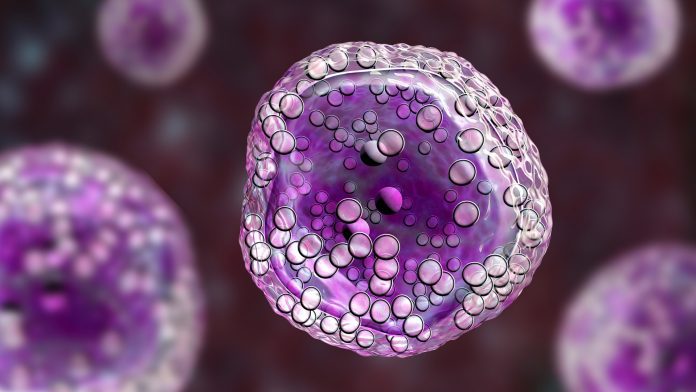
A substantial €1m in funding has been presented to advance lymphoma treatment, a significant milestone toward developing an effective therapy for the form of cancer.
Dutch blood cancer charity, Lymph&Co, is financing a €1m research grant to an international collaboration of experts from the Queen Mary University of London, Memorial Sloan Kettering Cancer Center (MSK), and Dana-Farber Cancer Institute to investigate a potential new lymphoma treatment.
The project’s objective is to analyse a novel treatment target for the disease, determine how targeting a protein known as KDM5 can effectively destroy lymphoma cells and which patients will benefit most from this type of therapy.
An innovative approach to lymphoma treatment
Lymphoma is a type of blood cancer that originates from white blood cells called lymphocytes, with modifications in lymphocytes’ genetic code, causing them to grow exponentially. This results in these white blood cells accumulating in the lymph nodes and other tissues, leading to the development of lymphoma. There are two primary types of lymphoma: Hodgkin’s and non-Hodgkin’s lymphoma (NHL), which comprise more than 60 subtypes.
Prior studies have elucidated that a considerable number of lymphoma patients have one or more mutations in their KMT2D gene, which codes for a protein involved in regulating gene expression in cells. However, mutations that stop KMT2D from properly functioning, which leads to changes in the expression of genes required for normal cell function, are the most common mutations detected in lymphoma.
Due to recent groundbreaking experiments, the research team believes that by targeting the KDM5 protein, which usually acts against the effects of KMT2D, they can reverse the consequences of KMT2D mutations in lymphomas, killing the lymphoma cells. Their novel lymphoma treatment project will enhance previous research that observed how KDM5 inhibition reverse the effects of KMT2D mutations in cell lines and preclinical models of germinal centre lymphomas.
Professor Jude Fitzgibbon, the lead researcher from the Barts Cancer Institute (BCI), said: “Thanks to generous support from Lymph&Co, we have the opportunity to create a unique international collaboration, to build on our groups’ understanding of KMT2D mutations and to determine if the potency of KDM5-inhibition is specific to germinal centre lymphomas or may have broader therapeutic potential in other non-Hodgkin’s lymphomas.”
KMT2D mutations
Mutations to KMT2D are present in between 5-20% of lymphoma subtypes and up to 80% of a lymphoma subtype called follicular lymphoma, the second most common type of the disease in the US, UK, and Europe. Because of this, the researchers will examine whether targeting KDM5 may provide an effective lymphoma treatment for a variety of subtypes. Furthermore, as KMT2D and related genes are mutated in a plethora of other cancers, the novel therapeutic approach of targeting KDM5 may be beneficial for combatting a range of cancers.
If the investigation finds that KDM5-directed therapy can successfully mitigate the effects of KMT2D mutations in lymphoma, it may help develop a new approach to lymphoma treatment. Additionally, the team is looking to identify KDM5 inhibitors suitable for early-phase clinical trials and what patients are likely to benefit from these therapies.
Dr Weinstock, Lavine Family Chair for Preventative Cancer Therapies at Dana-Farber and a Professor of Medicine at Harvard Medical School, said: “It is a tremendous honour to be part of this team under Dr Fitzgibbon’s leadership. Our hope is to harness the talent and resources across our research programmess to directly target one of the most important alterations in follicular lymphoma and other cancers.”
Dr Wendel, Professor on the Cancer Biology & Genetics Program at MSK, added, “This is a great time to translate understanding of cancer mechanisms into new lymphoma therapies.”
Dr Bob Lowenberg, chairman of Lymph&Co’s scientific advisory board, said: “The aim of Lymph&Co is to provide the leading doctors and scientists researching lymph node cancer with means that allow them to carry out this research anywhere in the world. Within this unique Lymph&Co research project, an international consortium of top researchers from London, Boston and New York will join forces and have the opportunity to search for better treatment options for patients with common forms of lymph node cancer. Lymph&Co looks forward to working with these researchers.”






















